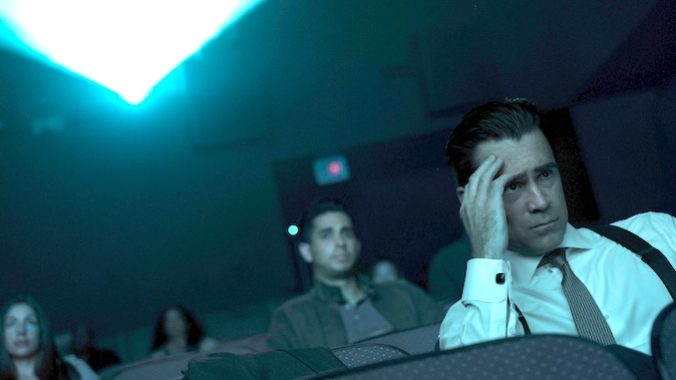Apple TV+’s Sugar Checks Some Noir Boxes but Falls Short of Greatness
Photo Courtesy of Apple TV+
It’s a reality of film and TV that a small set of great actors elevate a product to some minimum level just by the fact of their presence. There aren’t many of them, but Colin Farrell is one, and having him attached means a lot. It might theoretically be possible to make a bad TV show or a bad movie with Farrell as a star, but it would take incredible effort. There’s so much magnetism, so much substance and gravitas to the guy, that the sheer talent keeps the production above a certain threshold. It’s also a reality that no actor is good enough on his own to overcome fatal flaws; bad is bad, and if the writing and direction can’t deliver on their end of the bargain, the shortcomings will drag a great actor down before they can lift them up.
Sugar, the new L.A. noir show from Apple TV+, falls in a kind of shadow zone. Nothing about it is overtly bad—or, almost nothing—and Farrell is typically captivating as John Sugar, a man whose sole expertise is finding missing people for the rich and powerful. You want to watch him ply his trade, and he fully embodies a character whose unnatural empathy constantly conflicts with the necessity of violence and pain in the dark world he inhabits. The show, unfortunately, falls mostly flat around him, despite the fact that as a viewer you’re desperate for it to reach Farrell’s level. It’s that most tantalizing of shows—one that you feel should be good, that has you constantly leaning in expecting it to be good, but just never quite gets there. In other words, it’s a tease; it takes you a while to quit, but by the third or fourth episode, you start to realize there’s no heart.
The explanation is pretty simple, and it has nothing to do with the supporting players. From Amy Ryan as a recovering alcoholic tied up in a murder and disappearance to James Cromwell as a dying bigwig producer to Dennis Boutsikaris as his sordid son, there are good performances here. Even Kirby Howell-Baptiste, whose role as Sugar’s handler feels entirely superfluous, does her best in a meaningless role. Problem is, the mystery just isn’t very good, which is a reflection of the writing. There’s nothing to grab you, and as the drama around a young girl’s disappearance unfolds, you find yourself just not caring. Director Fernando Meirelles, famous for City of God, has a few tricks up his sleeve, and the disjointed narration and switches to black-and-white are often interesting in their attempt to depict Sugar’s vacillating mental state, but they can’t make up for a rough script.
Sugar is the latest example of the old truism that, in genres like mystery and noir, you can’t really survive a bad story. Plot is the be-all and end-all, and you can’t act or direct your way out of failure in that domain. The narrative is the bedrock that can be elevated by brilliance in those other roles, but if the bedrock is missing, there’s nothing to stand on, no purchase to be had, and the experience of watching becomes a slog.
-

-

-

-

-

-

-

-

-

-

-

-

-

-

-

-

-

-

-

-

-

-

-

-

-

-

-

-

-

-

-

-

-

-

-

-

-

-

-

-








































